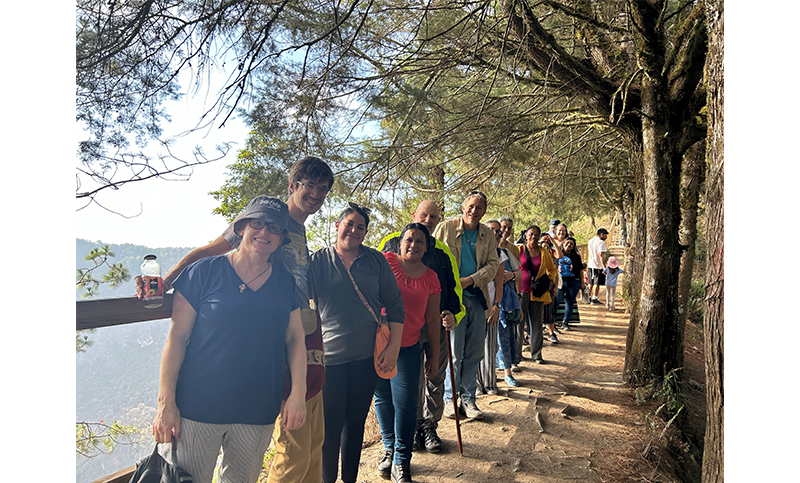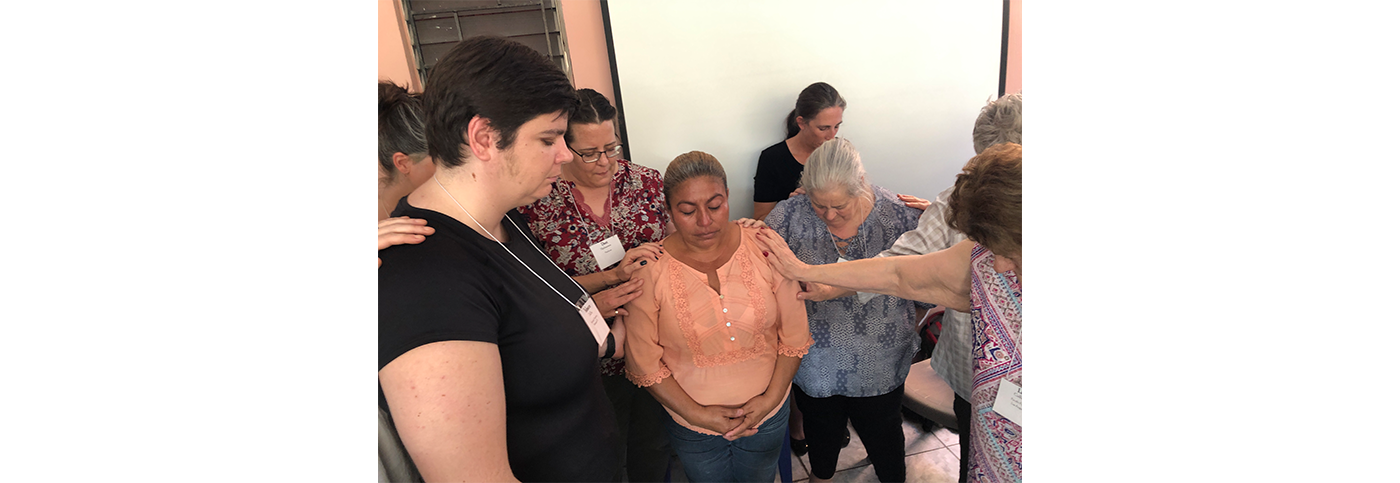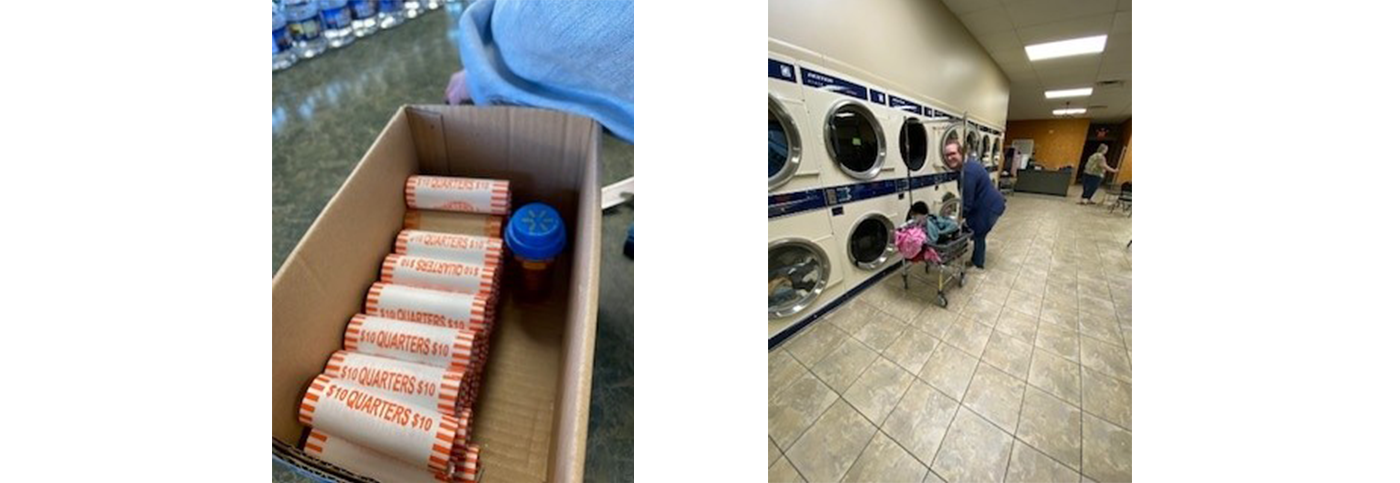Peace & Global Witness
Seeking reconciliation on the road
Gifts to the Peace & Global Witness Offering help Native Lands Travel Study Seminar ‘dismantle the legacy of Indigenous peoples losing their land, culture and language’
While traveling across the American Southwest last spring, Kathy Mitchell was caught by surprise.
Not as much by the many vistas that were new to her — although they were, of course, breathtaking — as by the stories of her fellow travelers.
“Everybody has a story,” said Mitchell, a ruling elder at Trinity Presbyterian Church in Chinle, Arizona, in the heart of the Navajo Nation. “Everybody deserves to be heard because their stories are beautiful. People’s stories of resilience, love, hope and triumph are especially important.”
Mitchell’s deeply held desire to share peace and seek reconciliation — both “with those parts of yourself and who you are called to be” as well as through others along life’s journey — unfolded over nine days on the road from Albuquerque, New Mexico, to Phoenix during the last of three travel study seminars hosted in 2023 by the Presbyterian Peacemaking Program.
Titled “Native Lands of the Southwest: The Doctrine of Discovery and its Legacy Today,” the Peacemaking Domestic Travel Study Seminar was a collaborative effort with the Presbytery of Santa Fe and the Synod of the Southwest, of which Mitchell is a former moderator.
The seminar’s varied program included opportunities for participants to visit historic sites, hear about Native American experiences, interact with Native American churches that are part of the PC(USA), and understand the implications of the Doctrine of Discovery, which gave Christian European governments the religious and legal justification to claim lands occupied by Indigenous peoples.
“As an Indigenous person, you live pretty much two lives,” said Mitchell. “Because you live as an Indigenous person and you also live your Christian life, you have to balance between those different parts of who you are. That is part of the struggle for many of us.”
Mitchell and the other members of the seminar’s planning team, Nelson Capitan, Judy Wellington, Roger Powers and Carl Horton, coordinator of the Presbyterian Peacemaking Program, believed that understanding first where each leader’s story came from would help them determine what would be most beneficial for the group, which numbered 35 participants from 15 states.
“That was something that I brought to the table, that is, living in this time now where you’re one generation away from boarding schools,” recalled the veteran public-school teacher and counselor, who has been in education for nearly 30 years. “My mom went to boarding school, and that’s not very long ago. The history is still very fresh. Coming at it from that perspective and understanding that everyone has a story, that was what inspired me the most — the beautiful stories of all the people that we met and how they ended up there. How they looked to their culture to help keep them strong.”
Mitchell’s call to peacemaking and reconciliation — including addressing and seeking to heal the trauma inflicted by the Doctrine of Discovery — is made possible, in part, by gifts to the Peace & Global Witness Offering.
Traditionally received on World Communion Sunday, which this year falls on Oct. 6, the Peace & Global Witness Offering is unique in that half of it is directed to peacemaking and global witness efforts at the national church level to address critical issues around the world. Twenty-five percent is retained by congregations for local peace and reconciliation work, and 25% goes to mid councils for similar ministries on the regional level.
One local congregation that is now deeply committed to the healing and repair of Indigenous nations and communities — thanks to two of its members who participated in the seminar — is Second Presbyterian Church of Richmond, Virginia.
“Living in Virginia and having never visited the Northern Plains states, in 2015 we took a 4,000-mile car trip in a loop from Minneapolis to Calgary and back and learned a great deal about the Indigenous nations in that area,” said Lucretia McCulley and her husband, Dan Ream. “That trip, especially, plus reading about Indigenous history and reading fiction by Native American authors, greatly increased our interest in learning more. Because exploring the Southwest was next in our plans, the opportunity that the Native Lands Travel Study Seminar offered for us to have conversations about history with Native Americans made this trip ideal for us.”
Not long after they returned to Richmond, McCulley and Ream gave a presentation to the congregation after worship about their life-changing experiences with the travel study seminar. They then followed up by submitting a proposal to the church’s Mission and Advocacy Council, which was later approved by the session, resulting in a $10,000 gift from the church to the PC(USA) to help with the immediate repairs and necessary improvements at Native American churches and chapels. Last Nov. 19, Second Presbyterian also celebrated Native American Day for the first time with prayers, liturgy and music during worship.
“As a Matthew 25 congregation, we are dedicated to eradicating systemic poverty, dismantling structural racism and building congregational vitality,” they said. “Through our gifts and our witness, we know that we will be assisting in a small way with dismantling the legacy of Indigenous peoples losing their land, culture and language.”
Another key learning for McCulley and Ream on this trip was seeing how “the experiences of the Pueblos differed from the Navajo nation and those from Gila River Indian Community.” They said their face-to-face meetings on the trip would help them “to always think of Indigenous people as individuals” moving forward.
“Sometimes the misconception is that all Native Americans are the same, but we’re all so vastly different,” Mitchell observed. “That’s another myth that can also be disseminated. Meeting the people was eye-opening for all of us, even for me.”
One particular memory that Mitchell shared with her fellow travelers evoked a robust congregational response.
“I tell people my story — that when I was 10 years old, there was a public library in my hometown that’s no longer there,” she recalled. “The closest library is in White Rock, New Mexico, which makes this a social justice issue. Because I now work with a nonprofit to bring the R.E.A.D. in Beauty Bookmobile into the community — the first of its kind on the Navajo Nation — that was one of the areas where a lot of the seminar participants said they and their churches could help by donating books or making donations. Presbyterians are very good at looking at justice as being a big part of the mission.”
One of the participants, Deb Church, pastor of the White Rock (New Mexico) Presbyterian Church, subsequently visited Mitchell in Chinle after the trip, where she was able to see the Bookmobile in action.
“I think meeting the people where they’re at is important,” Mitchell said. “As a human being, you want to be validated. You want to be heard. Those are important aspects to the travel study seminar — being with people.”
Yet the interpersonal interactions weren’t always easy.
“We had moments where it was hard to tell the truth, but telling the truth in love is also very important,” she added. “It really transformed me. Since truth and reconciliation is what Jesus came for, it’s important for us to be in that heart of learning and in that heart of healing and reconciliation, which is important for us as brothers and sisters in Christ.”
McCulley and Ream said that’s exactly why Second Presbyterian Church supports the Peace & Global Witness Offering every year.
“We are committed to sharing our gifts that will help address systems of conflict and injustice in the world,” they said. “We also need to live out the denomination’s commitment to peace and justice and Matthew 25 tenets in our communities and across the world. Small and large contributions to the Offering work together to make significant changes for peace in the places that we care about.”
Published by Presbyterian News Service.
read more stories:
participate with us
When we all do a little,
it adds up to a lot.
The Peace & Global Witness Offering draws Presbyterians together and provides exposure to active peacemakers as well as education and resources to empower congregations and individuals to become peacemakers, themselves. These collective efforts support resources in dealing with conflict, provide nurturing reconciliation, and stand in support of our global siblings, because the peace of Christ belongs to people everywhere.







